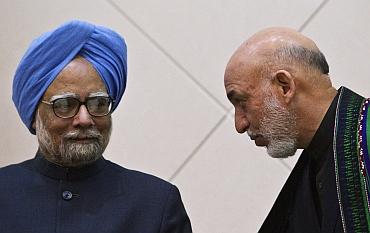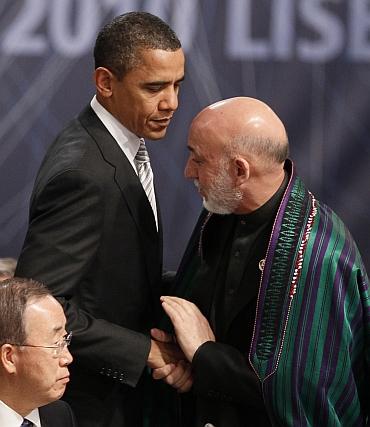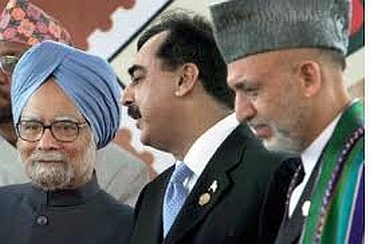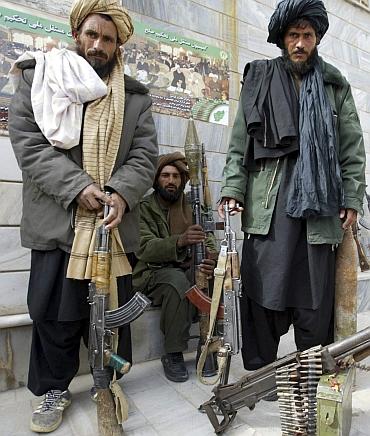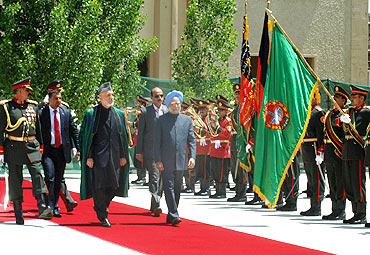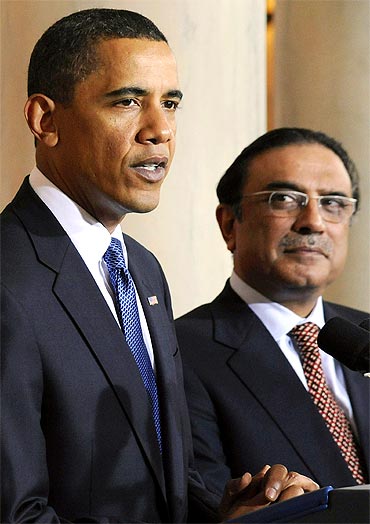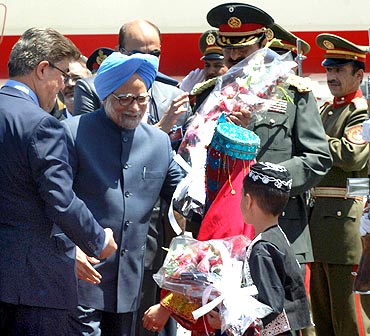 | « Back to article | Print this article |
Karzai visit: Why New Delhi needs to watch out
Afghanistan President Hamid Karzai's two-day visit to New Delhi poses a unique challenge for Indian policymakers, says former diplomat M K Bhadrakumar
The televised speech to the nation by Afghanistan President Hamid Karzai on Monday night set the tone for his visit to New Delhi on Tuesday. He adopted a markedly softer tone toward Pakistan and fell back to the classic stance on Pakistan's centrality in the search for peace in Afghanistan. At the same time, Karzai began groping for a resumption of talks with the Taliban.
Once again, the Indian policymakers face the challenge of getting the Afghan plot right. And it has always been an intricate plot with tricky undercurrents, even while looking deceptively simple, linear and one-dimensional.
Post-Rabbani travails for Karzai
Karzai is arriving in the Indian capital as a much-diminished protagonist in the Afghan peace process. The assassination of Burhanuddin Rabbani, head of the Afghan High Peace Council, has significantly weakened him. He had depended on Rabbani to bridge the ethnic divide in the country and to get the non-Pashtun groups on board in an eventual settlement with the Taliban.
He tapped Rabbani's old links with the Pashtuns as well as the veteran Mujahideen leader's longstanding equations with the Pakistani military and security establishment.
Karzai's vulnerability to the pressure from hardline non-Pashtun groups of the Northern Alliance, who never wanted to countenance the return of the Taliban to mainstream political life and who harboured a visceral distrust toward Pakistan, has also increased in the recent days.
Besides, Karzai is caught in a political and constitutional stalemate with a hostile parliament, which incessantly challenges his presidential authority and day-to-day governance. Many cabinet posts remain unfilled because of the lack of the requisite parliamentary approval of the appointments.
Click NEXT to read further...
US disdainful of Karzai's capacity to run corruption-free govt
All in all, Karzai badly needs political support from the United States at this juncture. But, on the other hand, the US remains disdainful of Karzai's capacity to run an effective government free of corruption in the critical period during which the drawdown of the American troops is slated to take place and Kabul is expected to assume the responsibility for security in the regions vacated by western troops.
As the year 2014 continues to draw closer by the day, from Washington's viewpoint, Karzai's ability to provide political and military underpinning remains in serious doubt in the judgment of the Barack Obama administration.
Clearly, Washington has its own priorities in Afghanistan in terms of a variety of factors linked to its regional and global strategies and its hands are full. It is in no position to take on the additional role of pulling Karzai's chestnuts out of the fire.
Click NEXT to read further...
Encouraging India to play role of a counterweight to Pak
Thus, Karzai is turning to Delhi in an oft-repeated option by the rulers in Kabul excercised in the past to encourage India to play the role of a counterweight to Pakistan. Karzai is looking to use Delhi at this juncture to acquire leverage to play himself back onto the centrestage of the talks with the Taliban as well as for gaining as much maneuvering space vis-a-vis Pakistan in the coming period.
In the immediate aftermath of Rabbani's assassination, Karzai took a hard line and called off talks with the Taliban. Of curse, this was a contrived stance since the talks had never really gained traction anyway and a replacement for Rabbani needed to be found, which would take time, as it isn't going to be easy, given the political fragmentation in Kabul.
Therefore, Karzai did a smart thing by suspending the talks with the Taliban, as his move also placated the irate NA groups and he could also hope to ride the wave of popular resentment in Kabul that Pakistan would have masterminded Rabbani's killing.
However, Karzai is a gifted politician and he knows that ultimately, the political track of reconciliation with the Taliban needs to be resumed and the sooner the better. He is well aware that he needs to get recognition and cooperation from Islamabad without which his profile as a serious negotiator with the Taliban would suffer (and his importance to the US would further diminish.)
Click NEXT to read further...
Karzai to resume talks with Taliban through renewed mandate
Monday night's address indicates that Karzai intends to resume the talks with the Taliban through a renewed mandate from loya jirga (nation's traditional assembly). Karzai needs a face-saving method and the loya jirga will provide that. In his speech, Karzai also distinctly softened his rhetoric on Pakistan after having assumed a strident tone only last week (which was also partly intended to please the NA groups) by suggesting that the Afghan-Pakistan relations were about to breakdown.
Pakistan, of course, understood Karzai's political motivations, while the US not only refrained from encouraging his rhetoric, but also pointedly counseled him to work within the framework of the Pakistan-Afghan-US trilateral commission (which met last week amidst all the grandstanding.)
The heart of the matter is that the US is in manifest haste to build up the momentum of a peace process so that it can garner the political winds at the Bonn conference on Afghanistan scheduled for December. Of course, Karzai is also savvy enough to grasp the great hurry on the part of the US President Barack Obama to wind down the war, and he wouldn't like to be left behind in a peace process.
Karzai wouldn't have missed out on America's growing readiness to have a deal with even the Haqqani network and Washington's heavy dependence on Pakistan to bring the Taliban on the negotiating table. The US efforts to bypass Pakistan and deal directly with the Taliban have ended in a cul-de-sac.
US Secretary of State Hillary Clinton's recent remarks in Arkansas underscored the criticality of Pakistan for the US regional strategies in general and particularly for bringing the Haqqanis to negotiate. The arrest of the top Haqqani figure, Haji Malik Khan, by the US troops last week effectively means that the US engagement of the group is likely to accelerate and, conceivably, Pakistan is already a facilitator.
Click NEXT to read further...
Karzai's plan to use India to gain political leverage
Karzai needs to sprint on the Afghan chessboard simply to retain his political relevance in the coming months. While in Delhi, he will make a careful assessment as to how far India would be useful for him to gain political leverage vis-a-vis Pakistan and the US.
Historically, Delhi is not unused to the role of a "balancer" in Kabul vis-a-vis Pakistan through the past six decades. However, the prevailing equations have certain peculiarities.
One, the notion voiced by some of our pundits that Afghanistan can be built up as a "second front" against Pakistan is not only fanciful but also is dangerous. The Kabul government is only one of the protagonists in the upcoming peace process and there is no certainty as of now that it is even going to be the most important one as time passes.
From the US perspective, Karzai fades into the sunset with the completion of his second term in 2014. Both the US and the United Kingdom not only welcome the prospect but are ensuring that Karzai doesn't run for a third term (by amending the Afghan electoral laws which forbid a third term).
The expectation in Washington and London is that by the time the drawdown will be complete and a viable peace process would have borne fruits, a new leadership will also emerge in Kabul in 2014. Indeed, the Afghan opposition also would expect the US and UK to ensure that Karzai stepped down in 2014.
In other words, Delhi needs to estimate carefully that a transition period lies ahead between now and 2014 when Karzai largely lends his imprimatur to galvanise the political and military processes over which he has no effective control as such. And at the end of it all, the real prospect exists that Delhi may have to deal with a government in Kabul that includes the Taliban -- and even the Haqqanis -- with Karzai having walked into the sunset.
Most certainly, therefore, Delhi will be exceedingly prudent about lending its voice or regional stature in any way -- howsoever remotely -- that might convey the impression of encouraging the irreconcilable NA groups who are known to have a closed mind toward the Taliban and wouldn't mind another round of civil war, if need be, toward that end (with foreign help, of course).
Click NEXT to read further...
Unrealistic for India to challenge the US-Pak condominium
Two, it is unrealistic for India to challenge the US-Pak-UK-Saudi condominium. In any case, Delhi is pretty much isolated on the Afghan problem and its weak regional policies do not provide it with the wherewithal to build a regional consensus at this late stage or take a lead role in forging a regional initiative in the nature of a Third Way in the Hindu Kush.
Three, India needs to factor in the ongoing dialogue process with Pakistan. Admittedly, there are hopeful stirrings of late, which it will be unwise on our part to overlook or ignore. On the contrary, our focus at the moment and for a foreseeable future should be to invigorate the dialogue process with Pakistan as much as we can.
Needless to say, there is a distinct shift in the Pakistani narrative, as evident from the recent address by its Foreign Minister Hina Rabbani Khar at the United Nations General Assembly and the visit of the Commerce Minister Makhdoon Amin Fahim to India.
Four and most important, India needs to think through the implications and potentials of the US's Silk Road project. With the Afghan endgame under way, the Silk Road project is reappearing on the drawing board of the US regional policies. (That is a separate subject that merits detailed scrutiny.) At the very minimum, we need to estimate what the project means for the country in the long term and for regional stability.
Click NEXT to read further...
Stick to Dr Singh's course on the Afgan problem
India's prospects of optimally making use of the US regional initiative (which is to be fleshed out at the forthcoming conference at Istanbul on November 2) will critically depend on the state of play in its relations with Pakistan and, of course, the regime that takes shape in Kabul in the post-Karzai era.
Evidently, therefore, India's course on the Afghan problem is best allowed to run on the track that Prime Minister Dr Manmohan Singh chartered during his path-breaking two-day visit to Kabul in May.
Deal with the established government in Kabul on a state-to-state basis; refrain from identifying with any Afghan group ploughing the furrows of its sectarian agenda; promote intra-Afghan reconciliation; focus on the traditional people-to-people relationship; avoid any form of military deployment; work with Afghanistan's neighbours to crate a helpful external environment for settlement; do all can to harmonise with Pakistan to the extent with a view to prevent Afghanistan from figuring as an arena of regional rivalry -- these are realistic parameters of policy and are eminently sustainable through the difficult corridor of time that lies ahead.
Equally, it is unthinkable from the viewpoint of regional security and stability that India can countenance Afghanistan erupting into another civil war.
